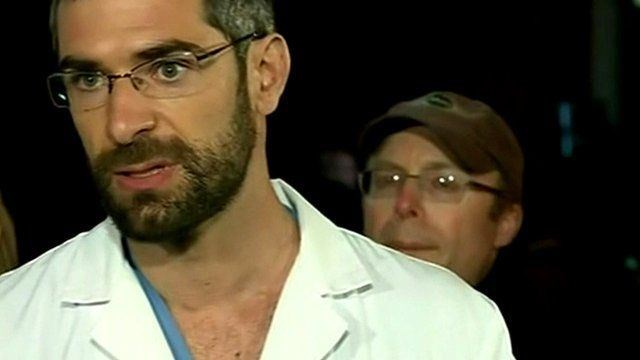 |
| This is Fagenholz on the news being interviewed. (Google images (http://www.bbc.com/news/world-us-canada-22163362)) |
My personal career hero has a very thrilling job. Dr. Peter J. Fagenholz works at the hospital in the department of surgery. He is a trauma and emergency surgeon. His everyday job would be considered heroic. But when the Boston bombing happened in 2013, he was one of the doctors who performed six major life saving surgeries, which makes him a true hero. I am interested in his career, because I would like to become either a family doctor or an emergency room doctor. To get to this career I need to start now, in high school. My goal is to go to Baylor University in Texas for my bachelor's degree and medical school.
According to the Occupational Outlook Handbook website, physicians treat people, by diagnosing illnesses, prescribing medication, and examining patients. Surgeons operate on patients with either an illness or injury. Most surgeons work all day, and don't get much time off. Becoming a physician or surgeon requires 4 years of undergraduate school, 4 years of medical school, and 3 to 8 years of residency depending on the type of doctor. As of 2012, surgeons are one of the highest paying jobs, they make around $360,000 a year. The outlook of physician and surgery is expected to grow eighteen percent between 2002 and 2022. Any other job that helps with others' health is similar to a surgeon; this includes dentists, and any kind of doctor. An improvement in medicine recently would be Obamacare. Obamacare is helpful for people who are young and don't have a lot of money, low income families, and anyone who needs financial help for Medicare. According to the website upcounse it expands the eligibility of Medicaid for low income families so they can afford it, offers cost assistance for health care, and many other things to make it easier for people to get health care. This is important because now more people will be willing to go the hospital if they really need to because it won't be an outrageous cost. The recent developments make a difference in doctors' careers because it can change the amount of patients they get.
According to Massachusetts General Hospital's website, Peter Fagenholz went to New York University School of Medicine Residency and Massachusetts General Hospital Fellowship. He started his practice in 2002. He currently works at Massachusetts General Hospital in a few different departments. These include, Emergency Surgery and Surgical Critical Care Department of Surgery. Fagenholz has been doing research on a few things, and the hospital's website specifies what he is doing it for. "Dr. Fagenholz performs clinical research on surgical therapies for pancreatitis, early management of head injury, and treatment of complicated forms of appendicitis and Clostridium difficile colitis. This means he is trying to find ways to help these diseases, either by finding cures or just medicines that help make life better if someone has the disease. He is also doing non-clinical projects which are the effects of hypoxia on intracranial pressure and pulmonary blood flow, and the use of ultrasound to monitor the effects.
Peter Fagenholz is a hero, because when the Boston Marathon bombing happened in 2013, he did six major surgeries for injured runners and spectators. According to a YouTube video of him being interviewed by USnews, Fagenholz explaining the situation, he said there a lot of small metal pieces, and he was not able to tell what they were from. Also that the injuries were all over the body, including bone injuries, soft tissue injuries and vascular injuries. There were no kids that he did surgery on. Fagenholz said in that same interview, "This is work. When this happens we just go to work." Not only did he do this, but just his regular job is a lot. He saves lives every day, whether it's life threatening surgeries, or just little surgeries that can make a big difference. When the bombing happened, Fagenholz did many lifesaving surgeries with no breaks. On the day of the bombing, John Phillips said, "Dr. Peter J. Fagenholz, you sir are a hero, as well. He has operated since 8 AM, stayed to treat Boston Marathon victims. Still going." All the doctors and surgeons working that day were heroes.
To become a doctor like Peter Fagenholz, I need to set goals for myself. My high school goals are to take as many science classes as possible, join clubs at school where I can do stuff at the Mission Hospital, our local hospital, and volunteer. I have an uncle who was a doctor, so he can help me through this and tell me what to expect in college. My college goals are to go to John Hopkins or Baylor University. Although I would love to go to John Hopkins, I am not the best student so it is more realistic for me to go to Baylor. The requirements for admission for Baylor are math, expository writing, humanities-social/behavioral sciences, organic chemistry, biochemistry, advanced biology, and Spanish is recommended. Those are the requirements for the school of medicine, so I need to do those during undergraduate school. I'm not sure what specialty I want to go in yet, but I know I will need a medical degree. I may not be a part of major surgeries in a bombing, but I can still make a difference in my community by helping others get and stay healthy.
Page created on 1/20/2016 12:00:00 AM
Last edited 1/20/2016 12:00:00 AM
